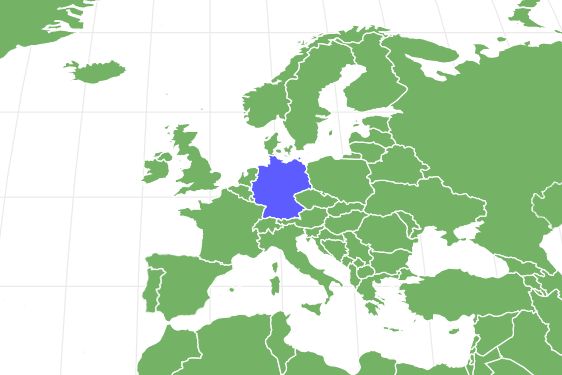German Longhaired Pointer
Canis lupus
German Longhaired Pointers are excellent hunters-tracking, pointing, and retrieving game over land and water. They can jump up six feet high and make wonderful emotional support dogs!
Advertisement
German Longhaired Pointer Facts
- Prey
- Birds, small animals
- Name Of Young
- Puppy
- Group Behavior
- Sociable
- Fun Fact
- German Longhaired Pointers are excellent hunters-tracking, pointing, and retrieving game over land and water. They can jump up six feet high and make wonderful emotional support dogs!
- Distinctive Feature
- Brown, speckled, or brown and white markings and furry ears
- Other Name(s)
- Deutsch Langhaar
- Temperament
- Calm, friendly
- Litter Size
- 4-6 puppies
- Diet
- Omnivore
- Average Litter Size
- 4-6 puppies
- Lifestyle
- Social
- Sociable
- Origin
- Germany
German Longhaired Pointer as a Pet:
- General Health
- Energy Level
- Shedability
- Trainability
- Intelligence
- Tendency to Chew
- Size
- Family and kid friendliness
- Yappiness / Barking
- Moderate
- Separation Anxiety
- High
- Preferred Temperature
- Average climate
- Exercise Needs
- High
- Friendly With Other Dogs
- High
- Pure bred cost to own
- $1000-$1800
- Dog group
- Sporting
- Male weight
- 55-80 lbs
- Female weight
- 55-80 lbs
This post may contain affiliate links to our partners like Chewy, Amazon, and others. Purchasing through these helps us further the A-Z Animals mission to educate about the world's species.
View all of the German Longhaired Pointer images!
German longhaired pointers are excellent hunters — tracking, pointing, and retrieving game over land and water. They can jump 6 feet high and make wonderful emotional support dogs.
German Longhaired Pointer
German longhaired pointers originated in Germany in 1879 and is considered one of the oldest continental pointers. They were bred for over a century to create the ideal gun dog. The German breeders mixed various dog breeds in order to achieve this excellent hunting breed: water dogs, scent hounds, and bird dogs. A hunter extraordinaire, the German longhaired pointer is not afraid to get its paws wet! German longhaired pointers are a dog breed specialized in tracking, pointing and retrieving game in all situations, from the water, upland, and woodland areas. This dog breed is incredibly versatile and adapted to be both gentle companions and spirited hunters.
German longhaired pointers are notoriously loyal and enthusiastic companions, often entertaining themselves and their humans during hunting expeditions. They are open to meeting new strangers and become extremely attached to their owners and family members.
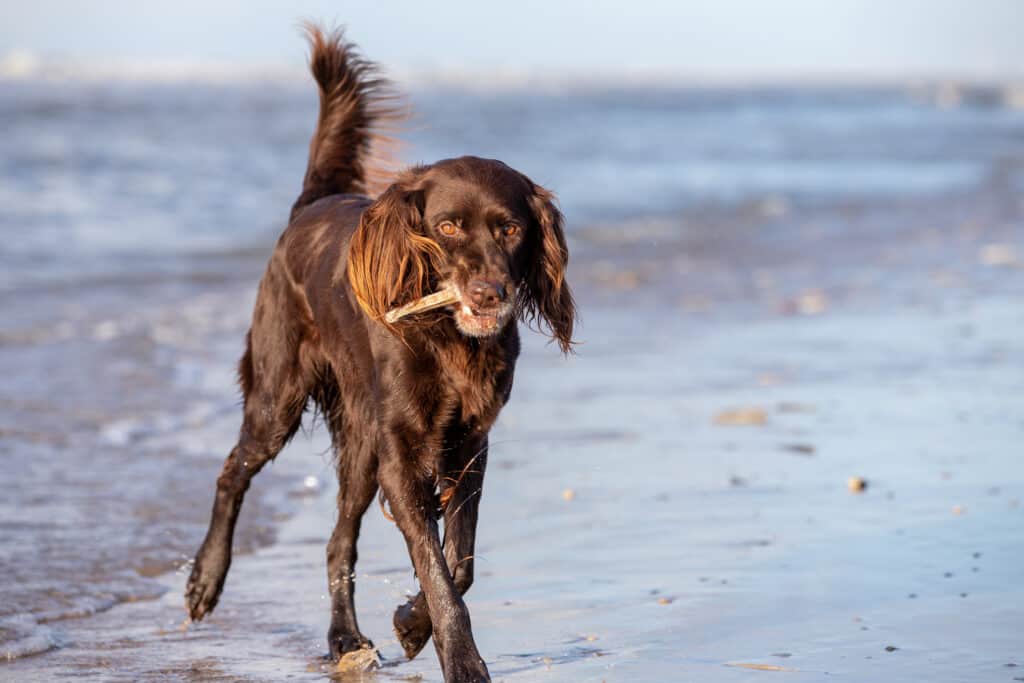
German longhaired pointers are trained in tracking, pointing and retrieving.
©iStock.com/JWB Fotografie
The Best Dog Food For German Longhaired Pointers
As an active dog breed, German longhaired pointers have nutritional needs similar to other sporting groups of dogs. They require high-quality food recommended twice daily for medium to large dog breeds. Of course, the ideal food for your German longhaired pointer would depend on its age, activity level, and weight. You should consult with your veterinarian to decide how much food you should feed your German longhaired pointer. It is also best to tailor your dog’s diet to include the proper nutritional requirements to offset any diseases or deficiencies the breed may be susceptible to.
It is worth remembering not to overfeed your German longhaired pointer as this can cause obesity, which can lead to a host of health complications.
As a high-energy breed, a protein-based diet is important to develop and maintain the muscles of the dog. That is why we have chosen Taste of the Wild Pacific Stream Grain-Free Dry Dog Food, which is formulated specially for active and sporting dog breeds. It contains 32% high protein, proprietary probiotics and prebiotics to support proper digestion and immunity, vitamins and minerals from fruits, and omega fatty acids to support a healthy skin and coat, vital for German Longhaired Pointers.
You can purchase Taste of the Wild Pacific Stream Grain-Free Dry Dog Food here:
•Nutritional, high protein food for large breed dogs
•Real protein as #1 ingredient
•Fruits & superfoods for vitamins & minerals
•Antioxidants, omega fatty acids, prebiotics
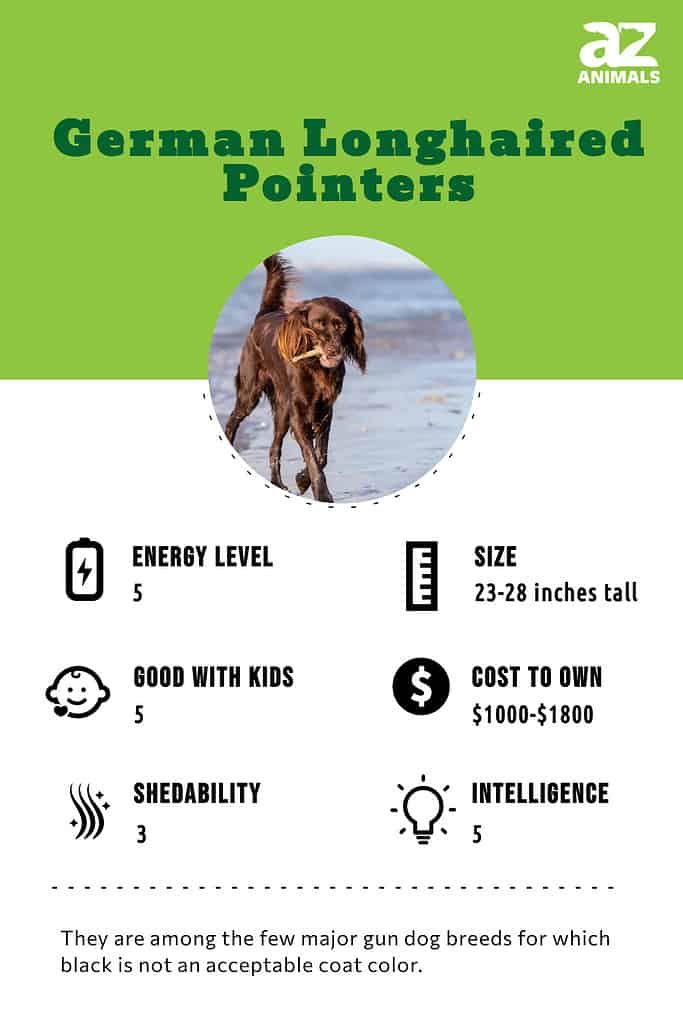
Owning A German Longhaired Pointer: 3 Pros And Cons
| Pros | Cons |
|---|---|
| Wonderful family dog: German longhaired pointers make excellent, loyal companions and are playful with children. They also relate well with other dogs and cats. | High exercise needs: German longhaired pointers are highly active and energetic dogs and require equally active owners who can keep up with their daily energy needs. If you’re not the outdoorsy type, you may want to reconsider getting this dog breed. |
| Beautiful to behold: German longhaired pointers have gorgeous brown, speckled, or roan medium-length coats which are dense and shiny. Proper maintenance will leave your dog looking regal and noble. | Requires regular upkeep: Due to their medium-length coat, German longhaired pointers need grooming once or twice a week, particularly after play sessions or hunting expeditions. |
| A skilled hunter: German longhaired pointers are ardent hunters, adapted for both land and water game. They are excellent in the field and woodland areas, and are amazing swimmers! | Not suitable for city life: Because of their high activity levels, German longhaired pointers prefer rural areas (vs urban areas) where they have space to run, play, and swim in order to keep fit. |
Types Of The Breed
The German Longhaired Pointer is available in several different colors: brown, dark chocolate, white and chocolate, roan (a pattern of intermixed white and colored hairs in the body while the head, lower legs, mane, and tail remain colored), dark roan, and mottled. While mottled is an accepted color, it is not one of the more desired coats. The only coat color not acceptable is black.
Size & Weight
The German Longhaired Pointer is a medium to large dog breed with weight averaging from 55-80 pounds, with males ranging from 25-28 inches in height and females at 23-26 inches.
| Height (Male) | 25-28″ |
| Height (Female) | 23-26″ |
| Weight (Male) | 55-80 lbs |
| Weight (Male) | 55-80 lbs |
Common Health Issues
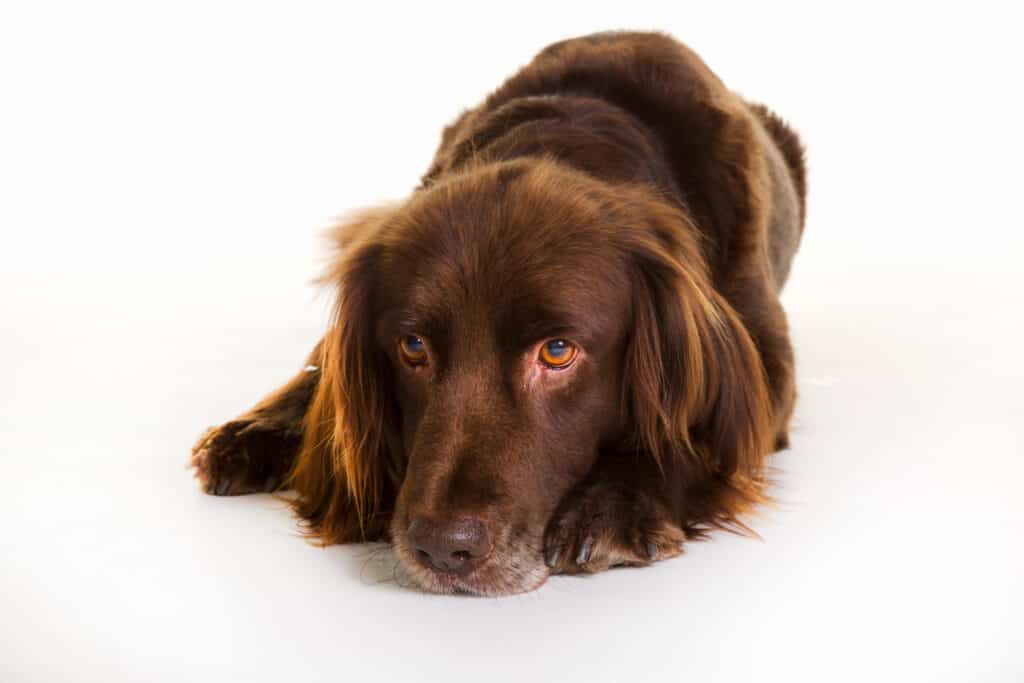
German longhaired pointers are prone to ear infections and their ears should be cleaned regularly.
©iStock.com/Bigandt_Photography
German longhaired pointers don’t have any known congenital health issues. However, they are prone to ear infections and wax buildup, and their ears should be cleaned regularly, especially after swimming. Hip dysplasia is also a common disease in German longhaired pointers. It is an inherited disease that is characterized by malformed hip joints, which can lead to arthritis and requires surgical treatment.
Another potential disease that could affect your canine is tooth infection, a disease that affects up to 80% of dogs by age 2. This could lead to your German longhaired pointer getting tooth decay and eventually losing its teeth. It can even endanger other vital organs such as the heart, kidneys, and liver. It is imperative that you regularly clean your dog’s teeth to prevent plaque and tartar buildup.
Gastric dilation and volvulus, or bloat, can also affect your German longhaired pointer even more so than other dogs because of the deep, tapered nature of its chest. Bloating can cause your dog’s stomach to twist around itself and cut off blood supply. This disease usually manifests when your dog eats a large meal too soon before or after exercise, or too quickly. The dog exhibits symptoms of this by lying down on its front paws and its rear end up in the air, or gagging without expelling anything. This condition is deadly. If your dog shows signs of it, rush them to the hospital immediately.
Lastly, cancer is another leading disease that the German longhaired pointer is prone to. Make sure to get your dog checked out periodically. Cancers can be removed surgically or through chemotherapy, and the key is early detection.
In total, the common health issues German longhaired pointers may experience are:
- Ear Infections
- Hip Dysplasia
- Tooth Infection
- Gastric Dilation and Volvulus (Bloat)
- Cancer
Temperament & Behavior
German longhaired pointers are affectionate, intelligent, and playful dogs. They are highly trainable and eager to please. They have been observed to be enthusiastic hunting companions and friendly with strangers. Because of their positive temperament, they make great family pets and love to play with children as well as other dogs.
These dogs are strong-minded and need confident owners whom they can rely upon for firm guidance. They love their family and thrive on social interactions with humans. They are known to form deep attachments to their loved ones and require human touch and presence. It comes as no surprise that they are known to suffer from separation anxiety when left alone for too long.
How To Take Care Of German Longhaired Pointers
It is crucial that new and prospective owners of a German longhaired pointer take into consideration not only the energy needs of these pups, but also their nutritional, emotional, and physical needs as well. Regular cleaning and grooming are required for these long-haired beauties as well as plenty of good food, love, and wide open spaces.
Care & Grooming
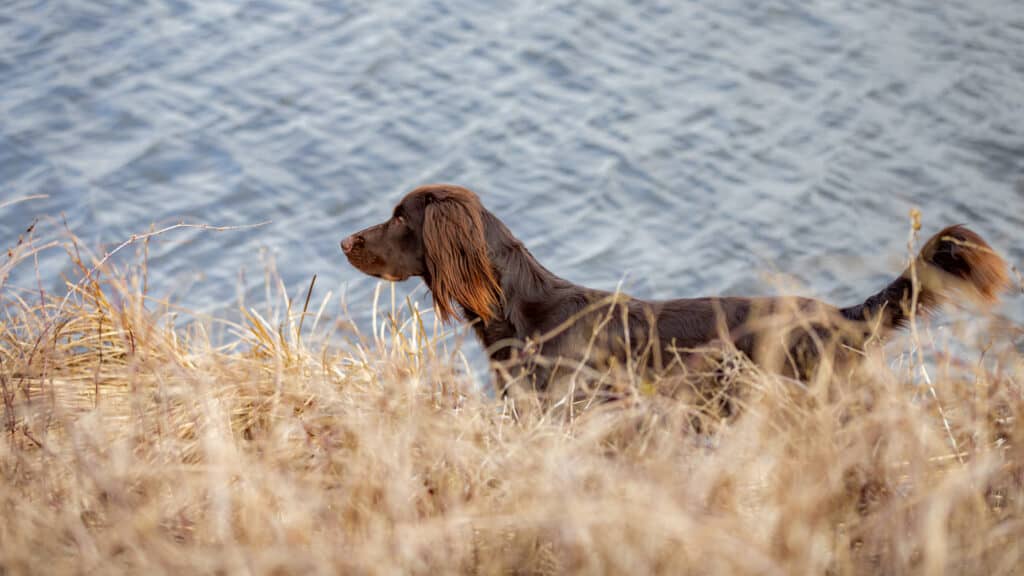
German longhaired pointers require regular maintenance and should be groomed once or twice a week.
©iStock.com/JWB Fotografie
German longhaired pointers are active hunting dogs and as such require regular maintenance. Their long coats are prone to burs from daily activity in fields, which would need to be trimmed off. Abrasions might also arise on their tails during hunts in heavy cover and therefore should be checked regularly. Apart from this, they do not require heavy maintenance and can do well with moderate grooming once or twice a week since they shed moderately. Their nails should be trimmed and clipped occasionally to prevent splitting and cracking. You should also remember that their ears should be cleaned of wax and debris regularly, including after swimming activities, in order to avoid buildup, which can lead to infection. Their teeth should be brushed regularly to prevent tooth infections or decay.
Training
German longhaired pointers are very intelligent dogs. Their eager-to-please personality makes training them a trouble-free experience. They love to work and need something to do, so this should be incorporated into their training routine. However, German longhaired pointers do not respond well to harsh training methods or negative reinforcement. It’s best to keep training sessions short as they are also easily distracted.
It is especially important that these dogs are trained to recognize smaller household pets as comrades instead of prey. Because of their fervent hunting instincts, German longhaired pointers need to be socialized as soon as possible from their puppy days.
Puppies
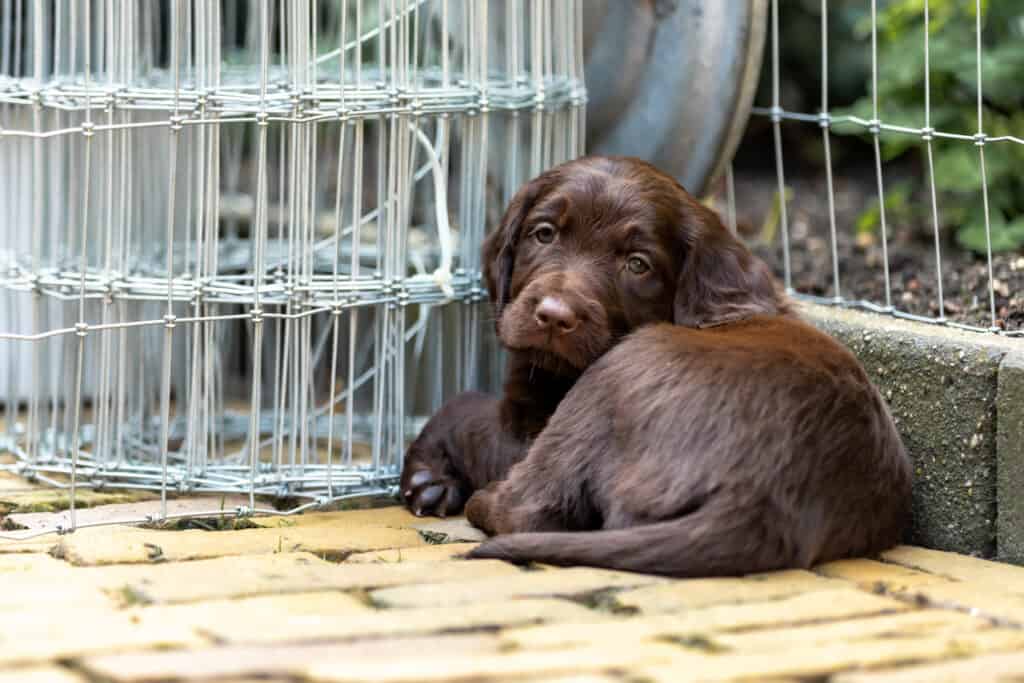
German longhaired pointers should be trained from their earliest days to distinguish between outdoor prey and smaller pets.
©iStock.com/JWB Fotografie
These should be trained to not be aggressive towards smaller pets because of their natural hunting instinct. It is best introduced at a young age to distinguish between outdoor prey and indoor pets. These dogs are very good learners and will catch on pretty easily.
Dogs Similar To German Longhaired Pointers
- English Setter: English setters and German longhaired pointers are similar in that they are both hunting dogs and they have similar temperaments. They are both loyal and affectionate companions. Male English setters weigh between 65-80 pounds. One difference between these two is their hunting maneuver. While English setters set their bodies low on the ground to indicate game to the hunter, German longhaired pointers use their whole bodies to point the game out.
- German Shorthaired Pointer: German Longhaired Pointers and German Shorthaired Pointers are cousin breeds. They are both hunting dogs and excellent swimmers. They differ by coat length, as their names suggest.
- Small Münsterländer: Small Münsterländers are similar to German longhaired pointers because they are both pointer dogs, which means that they sniff out and point out small game to hunters. One of the main differences between the two breeds is the size. Small Münsterländers stay true to their name, standing at a modest 19-22 inches and weighing only 33 pounds.
Popular Names For German Longhaired Pointers
Popular names for German Longhaired Pointers include:
- Archer
- Dakota
- Gunther
- Scout
- Cayden
- Luna
- Coco
- Hunter
- Moose
German Longhaired Pointer FAQs (Frequently Asked Questions)
How much does it cost to own a German Longhaired Pointer?
It depends on where you are buying from. Most breeders charge $1000 to $1800.
There are not a lot of breeders who breed German Longhaired Pointers though as it is a rarity. Adopting a German Longhaired Pointer puppy from a shelter or rescue would be a significantly cheaper option. Expect to spend another $300 on supplies for your new puppy before you take her home.
What is the difference between a German Longhaired Pointer and a German Shorthaired Pointer?
These cousin breeds differ by the length of their coat, as their names suggest. The German Shorthaired Pointer has a very short coat while the German Longhaired Pointer has a medium-length coat.
What is the lifespan of the German Longhaired Pointer?
The German Longhaired Pointer has an average lifespan of about 12-14 years.
Are German Longhaired Pointers good with kids?
Yes, German Longhaired Pointers are wonderful with children. They are loyal, playful, and affectionate dogs and would make a lovely addition to your family.
Thank you for reading! Have some feedback for us? Contact the AZ Animals editorial team.
Sources
- American Kennel Club, Available here: https://www.akc.org/dog-breeds/german-longhaired-pointer/#timeline
- United Kennel Club, Available here: https://www.ukcdogs.com/german-long-haired-pointer
- Aubrey Animal Medical Center, Available here: https://aubreyamc.com/canine/german-longhaired-pointer/
- UK Kennel Club, Available here: https://www.thekennelclub.org.uk/breed-standards/gundog/german-longhaired-pointer/
- Wikipedia, Available here: https://en.wikipedia.org/wiki/German_Longhaired_Pointer

